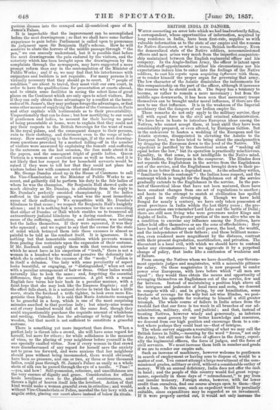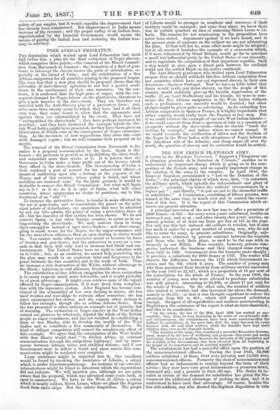BRITISH INDIA IN DANGER.
WHILE correcting an error into which we had inadvertently fallen, a correspondent, whose opportunities of information, acquired by long residence in India, have been first-rate, supplies us with valuable information as to the state of our empire and the reasons for Native discontent, or what is worse, British inefficiency. Even the demoralized state of the Native soldiers, noncommissioned officers and men arises very much from the imperfect companionship maintained between the English regimental officer and his company. In the Anglo-Indian Army, the officer is intent upon obtaining staff-appointments ; neither his circumstances nor his expectations induce him to enter into the feelings of the Native soldiers, to cast his repute upon acquiring influence with them, or to render himself the proper organ for governing that army. The low character of the Asiatic diminishes the inducements for this companionship on the part of the officer, although it increases the reasons why he should seek it. The Sepoy has a tendency to become, or rather to remain a mere mercenary; but from the middle ages downwards, it has been seen that mercenary troops themselves can be brought under moral influence, if there are the men to use that influence. It is in the weakness of the Imperial machinery that the dangers of our Indian empire lie.
These remarks do not only apply to the military service, they tell with equal force in the civil and criminal administration. eii
We have been in haste to introduce Europ ideas among the Natives, who cannot accept them, at least u til they have been considerably prepared, or even altered, by Eiir pean tuition. But in the endeavour to hasten a wedding of the European and the Asiatic systems, disappointed in elevating the Asiatic to the European level, we have tried to bring about the amalgamation by dragging the European down to the level of the Native. The expedient is justified by the theoretical notion of "making all equal before the law," but its operation is practically mischievous. Equality, in that sense, is not intelligible to the Native mind. To the Indian, the European is the conqueror. ' The Hindoo does not separate the Englishman in the service from the Englishman out of the service, and the Englishman brought down to their position is no better than a degraded man. As the schoolboy writes, "familiarity breeds contempt" : the Indian loses respect, and the contempt which is taught for the Englishman out of the service gradually extends to the Englishman in the service. In the pursuit of theoretical ideas that have not been matured, there have been constant changes from one set of regulations to another ; and haste in the attempt to snatch at civilization has spoiled all speed in really developing it. Though we have held Bengal for nearly a century, we have only taken possession of great provinces in India within the last thirty years ; the present generation can remembefLord. Lake and the battle of Delhi; there are still men living who were governors under Kings and Rajahs of India. The greater portion of the men alive who are in a condition to exercise any influence among the Natives, have either held office themselves or are the sons of officeholders ; they have heard of the military and civil power, the land, the wealth, and the independence of their fathers ; and these brilliant memories, even rendered more magnificent by the distance, contrast with their present degradation, mortification, and privation. The discontent is a local evil, with which we should have to contend under any circumstances ; but we aggravate it by a perpetual change of policy, that looks like a confession of weakness and of failure.
From among the Natives whom we have described, our Government appoints judges and magistrates, with a miserable pittance for salary. On these magistrates it is now proposed to confer power over Europeans, with laws before which "all men are equal " ; they would thus obtain the means and opportunity of revenging themselves on Englishmen out of the service, few and far between. Instead of maintaining a position high above all the intrigues and jealousies of local races and sects, we descend to compete with all ; and in giving, by our humiliation, some foretaste of revenge for the wily but not wise Hindoo, we positively whet his appetite for restoring to himself a still greater triumph. The whole course of failure in India arises from the twofold fact that our force is too weak in all branches of our administration, military, civil, and judicial ; and that, instead of treating Natives, however wisely and generously, as inferiors whom we must govern by our better knowledge and resources, we descend from our high position and encourage them to a contest where perhaps they could beat us—that of intrigue.
The whole survey suggests a recruiting of what we may call the British forces in India,—meaning by the word " forces " not only the Army, but still more the force of officers in the Army, especially the regimental officers, the force of judges, and the force of civil servants. We must increase them both in number and grade if we are to render our empire safe. Such an increase of machinery, however welcome to gentlemen in search of employment or having sons to dispose of, would be a matter of cost. You cannot attempt a large recruitment of the commissioned grades, military or civil, without a considerable outlay of money. With an annual deficiency, India does not offer the cash in hand ; and the people of this country would feel great repugnance, especially in these days of "retrenchment," to pay from our insular treasury. Foreign states, however, with far, lower credit than ourselves, find one course always open to them—they seek a loan. In this 'ease' such an expedient would be peculiarly suitable, since expenditure may be regarded as an investment. If it were properly carried out, it would not only increase the:
safety of our empire, but it would expedite the improvement that has already been eorameneed. But improvement in India means increase of the revenue ; and the proper outlay of an Indian loan, superintended by the Imperial Government, would secure the means of paying the Indian loan and restoring the Indian treasury to solvency.



























 Previous page
Previous page